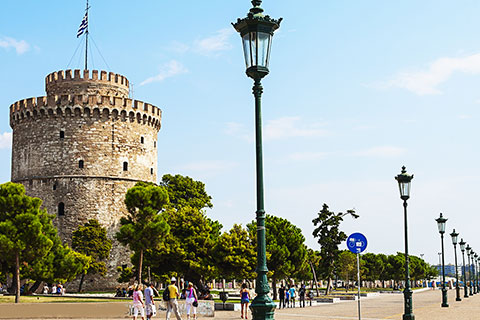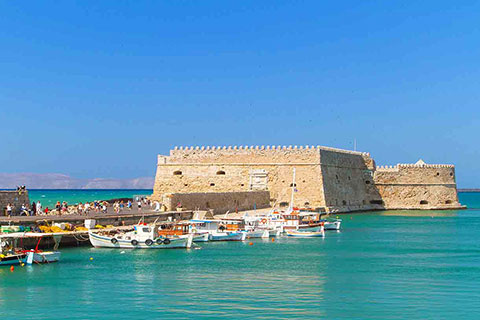
Study in Greece
Last edited on 02 Mar 2026
Welcome to Greece!
This Mediterranean country is widely recognized as the intellectual wellspring to which modern Western culture owes many of its linguistic, philosophical, cultural, legal, social and ethical beliefs and systems. Concepts of individualism, freedom, democracy and government all have their roots in the great thinkers of Ancient Greece, whose ideas are still widely read and debated today. Keen to follow in the footsteps of Socrates, Plato, Aristotle, Epicurus and so many other great questioners and innovators – while enjoying some delicious Greek cuisine, sunny weather and lively cities?
Whether you plan to study in Greece as an exchange, undergraduate or graduate student, you will enjoy Greece's impressive historical and cultural heritage. Greece, member of the European Union since 1981, is considered to be the cradle of the Western Civilization and also birthplace of the democracy, the Olympic Games, Western literature and historiography, political science, and major scientific and mathematical principles.
The geo-political position of Greece puts her in the center of attention in the south-eastern part of Europe. As a nodal point and entrance gate of the European Union, it is characterized by intense activation of not only Greek but also multinational companies in neuralgic financial sectors such as commerce, tourism and offering of services. The recruitment of these companies is in a great percentage made by the graduates of the country’s educational institutions that are distinguished by the high educational level that they provide. Education which is mainly related to the market’s trends, proportionally to the numerous years of experience of these institutions and their affiliations with other top European and American universities. By studying in Greece, you acquire not only the infrastructure needed for a successful professional career but also all the qualifications for further studies.
Higher Education System
You have several options for studying in Greece.You can enrol in an English-taught degree programme or if you speak Greek,enrol in a Greek programme.On the ather hand,if you are not interested in a degree programme but want to do your traineeship in Greece,there are several options that are worth considering.You may also want to take a look at the map of Greece,to see where Athens and Thessaloniki, the two cities which gather the majority of higher education institutions of the country,are located.
There are just over 20 universities in Greece, spread across the country and all within the public sector. While teaching is mainly in Greek, specialized study programs are also available in other languages (most commonly English), at both undergraduate and postgraduate level. These universities are joined by 15 Technological Educational Institutes (TEIs), which offer higher education programs with a focus on practical and professional skills, in subjects such as applied technology, healthcare, agriculture, management and art and design. Overall Greece’s higher education system is well-respected, ranked 41st in the world in the first edition of the QS Higher Education System Strength Rankings.
Student Cities in Greece
Athens

Beneath the iconic Acropolis – the internationally recognizable ancient site which continues to dominate the Athens skyline – the Greek capital buzzes away as one of the busiest cities in Europe. Its wider metropolitan area is home to some 3.75 million people, a significant chunk of the total national population of around 11 million. Athens is also one of the world’s oldest cities, having been continuously inhabited for at least 7,000 years, and it remains one of the globe’s most prominent archaeological and cultural hubs. While still known for its often chaotic traffic, Athens now boasts one of Europe’s largest pedestrian zones, covering a large part of the historic center, and in recent years has enjoyed a new wave of stylish shops, restaurants and hotels. All of this makes for an exciting and eclectic student experience, from historic sites to modern bars, and vibrant nightlife to leisurely coffees.
Athens is home to some of the most prestigious universities in Greece, including the National Technical University of Athens, the National and Kapodistrian University of Athens and the Athens University of Economics and Business.
Thessaloniki

Greece’s second-largest city, Thessaloniki is the administrative capital of the region of Macedonia. Located on the coast towards the north-east of the country, it has a long history (spanning 2,300 years) of being a major commercial, economic and cultural center, and in recent years has risen to growing prominence as a top choice for travelers. Thessaloniki was once the “co-reigning” city of the Eastern Roman (Byzantine) Empire, alongside Constantinople, and this has left a legacy of historic Byzantine buildings and structures. Today, the city is known for its vibrant cultural scene, café culture and nightlife. It’s the home of the Greek National Theatre, prides itself on having one of Europe’s most impressive ratios of cafés and bars per capita, and has been listed among the world’s top five “ultimate party cities”. It was also the 2014 European Youth Capital.
Thessaloniki is home to the second highest-ranked university in Greece, the Aristotle University of Thessaloniki. Also located here is the University of Macedonia, another of the largest universities in Greece.
Heraklion (Crete)

The administrative capital of the island of Crete (the largest among the Greek islands), Heraklion is the fourth-largest city in Greece. As you’d probably expect of any major Greek metropolis, Heraklion (also known as Iraklio) has a long and interesting history. Established in 824 by the Saracens, the city has been occupied by numerous different civilizations and empires, before being incorporated into Greece along with the rest of Crete in 1913. Following a recent period of renewal, it combines a rich and diverse cultural legacy with a new urban polish, and as a leading hub for Cretan nightlife, commerce and cuisine, it’s popular among tourists and international students alike.
Heraklion is home to one of the two campuses of the University of Crete (the second is in the town of Rethymnon), as well as the Technological Educational Institute of Crete.
Application, Fees and Visas in Greece
Applying to study in Greece
To apply to study in Greece at undergraduate level, you need to submit your application through the Hellenic Ministry of National Education and Religious Affairs. If you wish to study at postgraduate level, you can send the necessary documentation directly to the institution you have chosen. Although Greece is not a part of the Lisbon convention (which seeks to guarantee students’ qualifications will be recognized across Europe), it’s still possible to apply to universities in Greece using a certificate showing successful completion of secondary education in your home country. You may also need to provide proof of proficiency in Greek or another language, depending on the language in which your course will be taught. Some programs may have additional requirements, depending on the field of study and the institution.
Visas to study in Greece
Citizens of the European Union will be happy to hear that they do not need a visa to study in Greece. However, if you come from a non-EU country, you need to obtain a student visa (type D) from your nearest Greek embassy or consulate. To do so, you first need an official acceptance letter from your chosen university in Greece, which must be an institution certified by the Greek Ministry of Education. Contact the Greek Embassy in your country, or consult the Greek Ministry of Foreign Affairs website, for a detailed list of the documents required for a student visa and information about how to submit your application. You will need to attend an interview to gain your visa.
All students, both from EU and non-EU countries, must prove they have health insurance, enough money to support themselves during their expected stay, and a valid passport.
Fees and funding
Universities in Greece do not charge tuition fees to domestic students at undergraduate level. Since Greece is a member state of the European Union, this also applies to all students from EU/EEA countries, at all public universities and colleges. Some master’s programs do charge fees, and students from non-EU/EEA countries will also be expected to pay tuition fees at bachelor’s level. These vary depending on the institution, but are usually around €1,500 (~US$1,680) per year, often including course textbooks.
Students will also be pleased to know that living costs in Greece are some of the lowest in Europe (although unfortunately this is due to the country’s recent economic difficulties). As would be expected, it is more expensive to live in a large city, but overall you should only need around €600 a month, or €7,200 (~US$8,080) a year.
Fast fact
- Republic, with the president serving as head of state (current incumbent is Prokopis Pavlopoulos)
- Official name is the Hellenic Republic, and official language is Greek (also called Hellenic).
- As well as the mainland, Greece is made up of more than 2,000 islands, of which approximately 170 are populated.
- Bordered by Albania, Macedonia, Bulgaria and Turkey
- Population of around 11 million
- The modern Greek state was established in 1830.
- Voting is required by law.
- 17.5 million tourists visit Greece annually.
- Currency: Euro (€)
- Eastern European Time (UTC+2), switching to Eastern European Summer Time (UTC+3) between March and October





